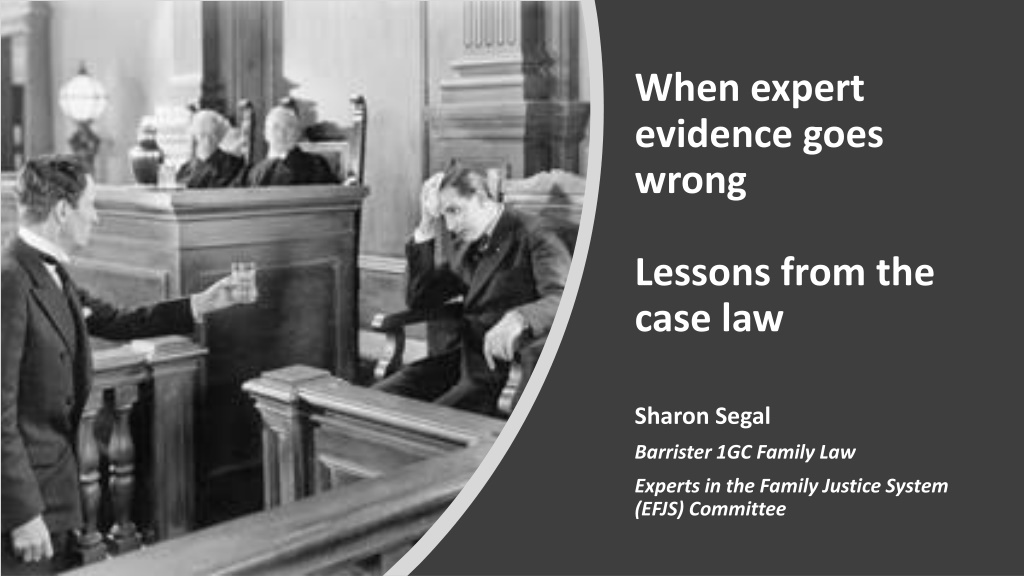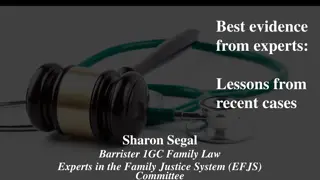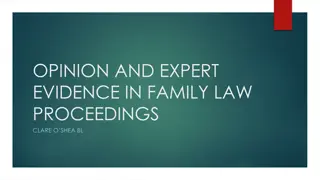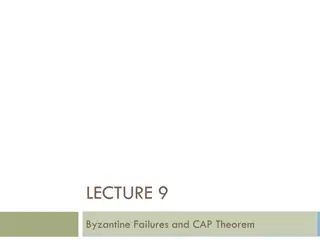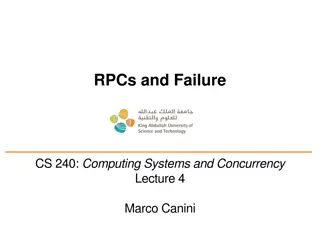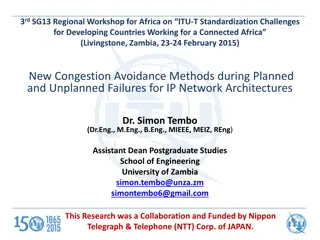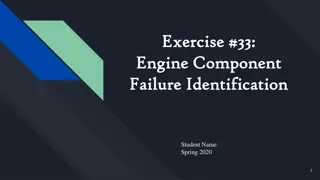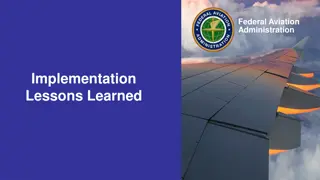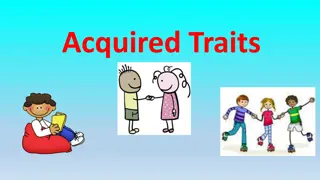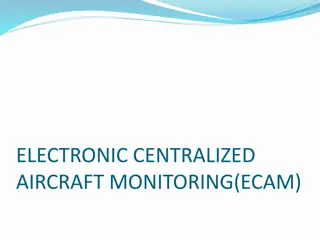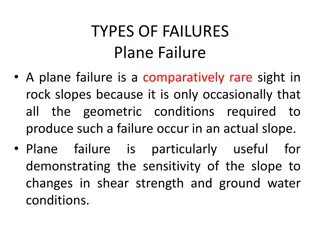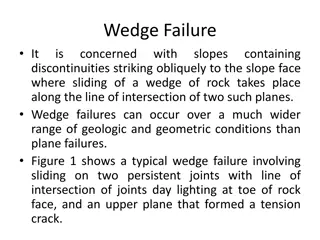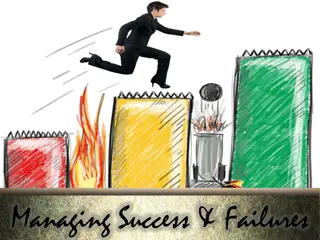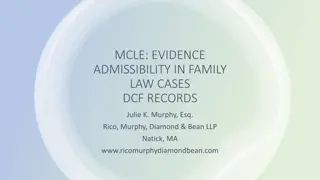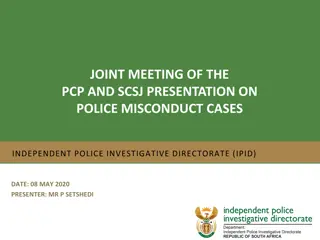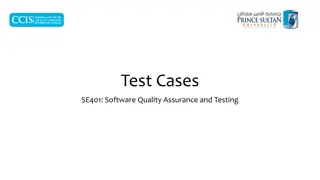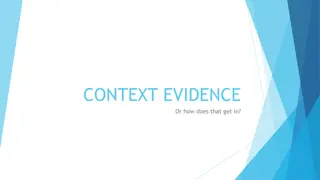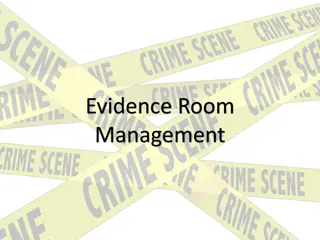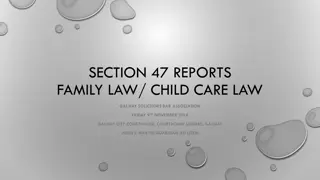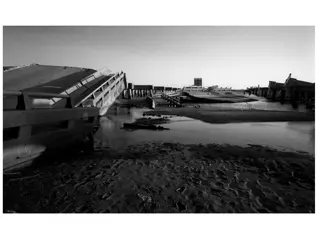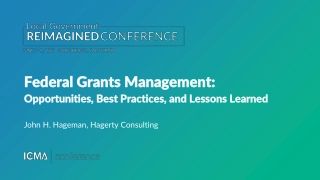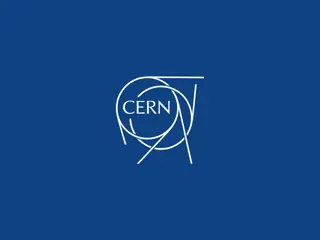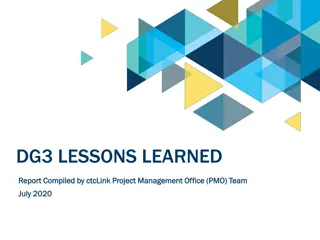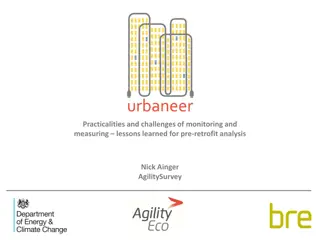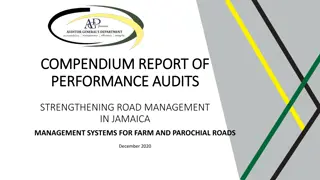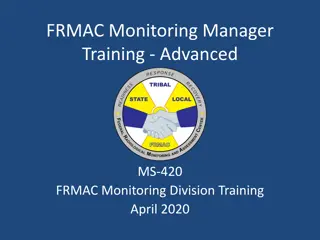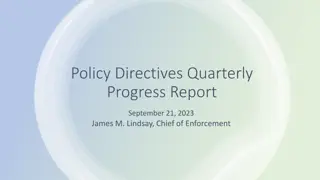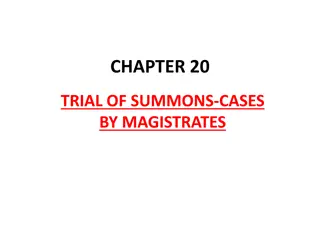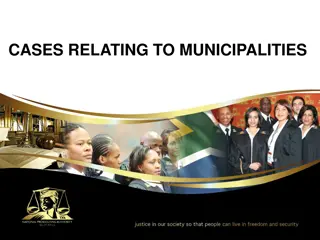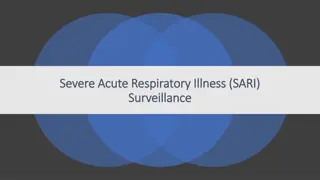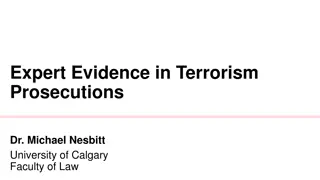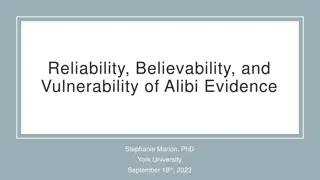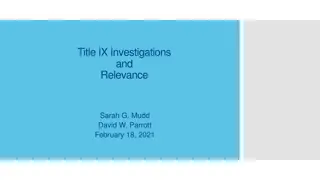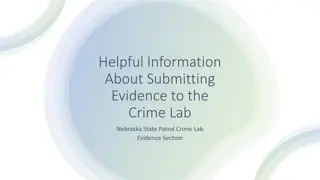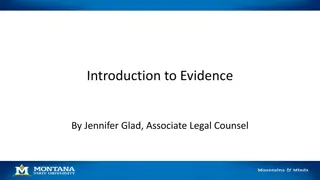Lessons Learned from Expert Evidence Failures in Family Law Cases
Discussions on the consequences of expert evidence errors in family law cases are presented through real case examples. The importance of considering all material facts, avoiding basic errors, and ensuring experts' competence is emphasized. These instances highlight the impact of inadequate expert reports on judicial decisions and call for stricter adherence to professional standards.
Download Presentation

Please find below an Image/Link to download the presentation.
The content on the website is provided AS IS for your information and personal use only. It may not be sold, licensed, or shared on other websites without obtaining consent from the author. Download presentation by click this link. If you encounter any issues during the download, it is possible that the publisher has removed the file from their server.
E N D
Presentation Transcript
When expert evidence goes wrong Lessons from the case law Sharon Segal Barrister 1GC Family Law Experts in the Family Justice System (EFJS) Committee
Considers all material facts in reaching conclusions Is objectively justified Is properly researched Considers all material facts which could detract from their concluded opinion Falls within the expert s competence
When expert evidence goes wrong 1. Basic errors 2. Analysis 3. The dogmatic expert
Basic errors Basic errors Not answering the questions asked sufficiently, or clearly: Coventry City Council x V, Y and Z [2011] 1 FLR 1045 indigestible completely fails to address the issue in any meaningful way . I would have expected that in an expert report such as this the expert would have defined terms and referred to relevant literature on the topic for example by explaining what fabricated illness is and what he had been looking for as he trawled through these medical records. All of this is completely absent from the report . HHJ Bellamy
Basic errors Basic errors Re NL (Appeal: Interim Care Order: Facts and Reasons) [2014] 1 FLR 1384 I am gravely troubled by the speed, the manner and the ambit of Dr van Rooyen s involvement. It simply cannot be right, fair or reasonable to commission an expert to provide what may turn out to be the pivotal evidence justifying separation of a neonate from his mother in the way that happened here. It surprises and alarms me that Dr van Rooyen was asked, and was prepared, to provide a report during the course of a single working day, a terrifyingly tight timeframe, and on the basis of papers supplemented by a telephone conversation with a local authority professional who had never met the mother. I struggle to understand how Dr van Rooyen s apparently firm opinions, adverse to the mother, could have been formed given the complete absence of any kind of discussion with her or, indeed, any communication with [the resource]. To my mind, it is quite simply unacceptable for an 'independent' expert to be instructed in the way Dr van Rooyen to conduct such a scant inquiry in preparation for a hearing which was to have such wide ranging consequences for the child . Pauffley J
Basic errors Re F [2016] EWHC 2149- a manipulation of material The overall impression is of an expert who is overreaching his material, in the sense that whilst much of it is rooted in genuine reliable secure evidence, it is represented in such a way that it is designed to give it its maximum forensic impact. That involves a manipulation of material which is wholly unacceptable and, at very least, falls far below the standard that any court is entitled to expect of any expert witness. Moreover, it is manifestly unfair to the mother, who it should be emphasised is battling to achieve the care of her children whilst trying to manage life with diagnosed PTSD. Ipso facto this is a case of unique gravity and importance. Common law principles of fairness and justice demand, as do Arts 6 and 8 of the European Convention for the Protection of Human Rights and Fundamental Freedoms 1950 (the European Convention), a process in which both the children and the parents can properly participate in a real sense which respects their autonomy. Dr Harper's professional failure here compromised the fairness of the process for both mother and children . Hayden J
Analysis Analysis- -differential diagnosis differential diagnosis Oldham Metropolitan Borough Council v GW and PW [2007] 2 FLR 597 I have also come to the clear conclusion that experts should be asked not only whether their opinion is mainstream or orthodox (as they were in this case) and what the range of orthodox opinions might be, but also whether within that range of opinions the answer might be that the cause of an injury is unknown, highlighting the unusual features of the case that may indicate contrary interpretations. In essence, they should take the court through the differential diagnosis highlighting any contradictory or inconsistent features. This balance sheet approach is used in many expert disciplines and areas of litigation and is almost universally of assistance. The court and experts generally may have become too focused in trying to reach agreed solutions to difficult problems. Experts are asked to inform the court of their agreements and their disagreements: the latter can often be as important as the former . Ryder J
Analysis Analysis- - a controversial hypothesis a controversial hypothesis Re AB [1995] 1 FLR 181 There are sometimes cases in which there is a genuine disagreement on a scientific or medical issue, or where it is necessary for a party to advance a particular hypothesis to explain a given set of facts. Where that occurs, the judge will have to resolve the issue which is raised. Two points must be made. In my view, the expert who advances such a hypothesis owes a very heavy duty to explain to the court that what he is advancing is a hypothesis, that it is controversial (if it is) and to place before the court all the material which contradicts the hypothesis. Secondly, he must make all his material available to the other experts in the case. It is the common experience of the courts that the better the experts the more limited their areas of disagreement, and in the forensic context of a contested case relating to children, the objective of the lawyers and the experts should always be to limit the ambit of disagreement on medical issues to the minimum . WallJ
The dogmatic The dogmatic expert expert The court must always be on guard against the over-dogmatic expert, the expert whose reputation or amour propre is at stake, or the expert who has developed a scientific prejudice Re U (Serious Injury: Standard Of Proof); Re B [2004] 2 FLR 263
Scientific prejudice? Scientific prejudice? A Local Authority v S [2010] 1 FLR 1560 In considering whether these experts had developed a scientific prejudice the court had to consider whether the experts' respective beliefs: (i) in Geddes III, and (ii) that trauma might only be regarded as likely causation where the triad was accompanied by additional external injury (or alternatively a witness), had led to their convictions overwhelming their forensic analysis of the case. To determine that issue the court had to consider: (i) the experts' use of research material; (ii) their willingness to defer to experts in another field, including their acceptance of the importance of confining their respective opinion to their own expertise; and (iii) the importance in any forensic examination of factual accuracy The courts relied upon the professionalism and rigor of experts; that meant not only drawing the court's attention to research that was contrary to their own view, but rigorous use of research papers.
Scientific prejudice? Scientific prejudice? It was crucial in cases involving an allegation of shaking, which were inevitably and necessarily multi-disciplinary in approach, that each expert kept within the bounds of their own expertise and worked in a collaborative way with the other experts to see if a diagnosis could be reached. Each expert must defer to the expertise of others more qualified to comment on certain areas, and must do so not grudgingly or reluctantly, but in ready acknowledgement of the greater expertise and knowledge that other specialists might have in relation to certain aspects of the case. It was of the utmost importance that all experts, whether mainstream or not, read all the papers, and where they had to rely on raw data, that they checked its veracity and accuracy in the medical notes; fairness to the parties demanded, as a basic premise, that experts be accurate in their use of source material. No criticism was made of the fact that the two experts did not hold mainstream views, but a rigorous forensic analysis was required in care proceedings: both experts had developed a scientific prejudice, and one of them had permitted her convictions to lead her analysis
Thank you for listening Sharon Segal segal@1gc.com
